Large Equipment Offerings Buoyed by New CNC
To complement the strengths of many of its larger machine tools, Tarus has added a Heidenhain CNC to benefit those manufacturers seeking high-quality contour surface milling capabilities.
Share








Hwacheon Machinery America, Inc.
Featured Content
View More

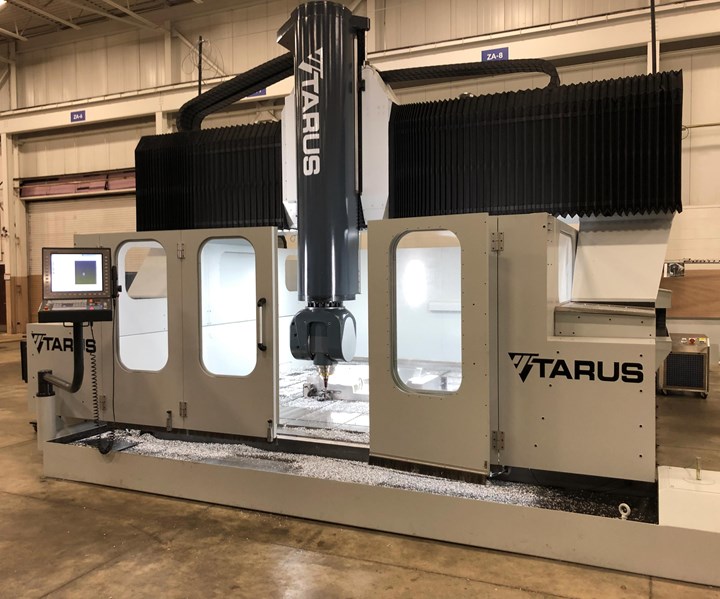
This Tarus TBM5 gantry is equipped with a TNC 640, Heidenhain glass scales and Etel torque motor/direct-drive ball nuts.
As more and more manufacturers are seeking high-quality contour surface milling capabilities, Tarus Products Inc., a large U.S. machine tool builder based in Detroit, is rising to the challenge. Recently, it has made significant technology investments, spearheaded by its inclusion of the Heidenhain TNC 640 CNC on many of its large equipment offerings.
“We are excited about the changes made here over the last couple of years that give our manufacturing customers the edge they need to compete in today’s global marketplace,” explains Doug Greig, who co-owns Tarus with his brother Dave.
“Tarus has always been known to have great build on its machines, many say ‘strong bones.’ And we’ve now upped the game with machine performance levels of increased speed and accuracy highlighted by five-axis capabilities with the Heidenhain TNC controls and linear and rotary encoders, predominantly. We believe this is a great one-two punch,” Dave Greig says.
Innovations from Day One
Established in 1969, Tarus serves the automotive, aerospace and mold and die manufacturing industries. Tarus’ bridge and gantry milling machines feature an average work envelope ranging from 7 by 10 feet to 14 by 60 feet. Besides large CNC milling machines, Tarus builds combination deep-hole drilling (gundrilling) and milling machines for moldmakers as well as specialized multi-spindle, deep-hole drilling machines used in the nuclear industry for critical steam generator tube sheets.
From the mid-1970s until 2008, Tarus developed and used its own CNC for its milling, gundrilling and measuring machines. After that, the company started building machines with customer-specified CNCs. In 2017, Tarus decided to make a shift to the Heidenhain TNC 640, with the first machines delivered in 2018.
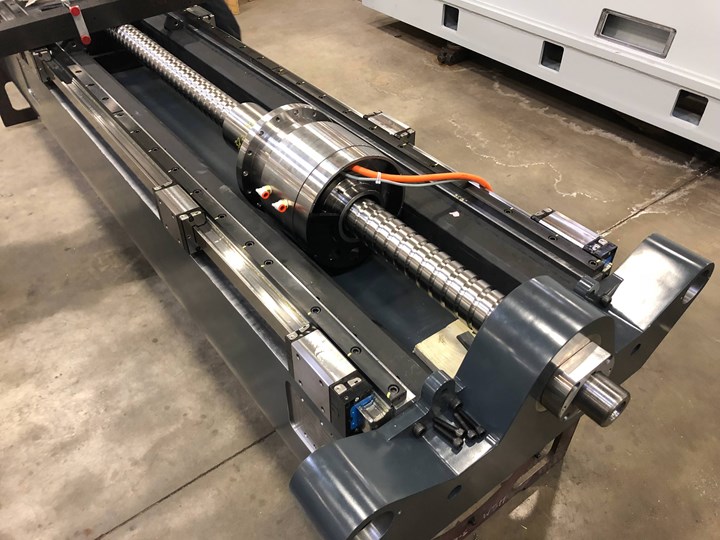
An Etel torque-motor-equipped, direct-drive ball-nut assembly at Tarus.
Tarus has been a long-time customer of Etel, a supplier of linear and multi-pole torque motors, owned by Heidenhain. One of the signature innovations at Tarus is its development and use of Etel torque motors in a direct-drive ball-nut assembly found in its PMT bridge and TBM gantry CNC machines. These torque motor assemblies are used to drive each machine axis (X, Y and Z) and result in improved efficiency, less wind-up and increased overall axis stiffness/rigidity.
CNC Features Change the Game
“Tarus has some great machines with great features, but when it comes down to it, the customer really only cares about how fast they can complete their job, what is the uptime on their machine and how does their end product look,” explains Brad Kleinow, director of service. “The fast speed, strong reliability and superior surface quality that Heidenhain brings to the Tarus machines has proven to be a game-changer.”

Tarus uses the Heidenhain TNC 640 on many of its large equipment offerings with plans to offer retrofitting of many of its current machines to this control in the near future.
According to Doug Greig, part surface finish tends to be smoother and cleaner with the TNC 640 when compared to the older Tarus machines equipped with the previous Tarus CNC. After a thorough testing process in which the TNC 640 performed even better than expected, and due to the fact that many of the company’s main markets now require the Heidenhain, Tarus is now predominately using the new control on its large, high-performance machines.
“The TNC 640 control is our preferred choice for these applications because of the reliability and performance it provides as a result of pairing it with the Heidenhain motion control feedback encoders,” Doug Greig says. “We believe that this coupling allows us to be the best at serving our machining markets in the long run.”
Overall, the Heidenhain TNC 640 control is designed for mill-turning, high-speed cutting and five-axis machining on machines with as many as 18 axes. It is a workshop-oriented, high-powered and user-friendly control featuring numerous functions. For Tarus customers, some of those features include:
- 3D tool compensation through surface normal vectors
- Tool Center Point Management (TCPM) that uses a handwheel to change the angle of the swivel head during program run without effecting the position of the tool point
- Tool radius compensation normal to tool direction
- Tilting working plane transformation coordination
- Block processing speed of 0.5 ms
- Kinematics option for automatic measurement and compensation of positions in rotating axes
“The combination of features on the Tarus machines promises to provide users with increased performance, faster speeds, more flexibility, reduced setups and more uptime,” says Doug Greig.
Outlook and Opportunity
“We believe the changed philosophies and revamping done here at Tarus over the last few years is exactly what the manufacturing industry needs to excel in today’s marketplace,” Dave Greig says. “We are proud of our long history and the successful use of Heidenhain encoders that were helpful during our transition to current improved five-axis control technology.”
In fact, the company expects to be involved with retrofitting many of its current machines in the field with these latest generations of Heidenhain controls, drives, motors and feedback, Mr. Kleinow says.
To support the overall increase of Heidenhain controls in the field, Heidenhain provides on-site application training at the end user by arrangement. Users can also attend TNC training classes at the TNC-CNC Academy in Schaumburg, Illinois.
The Greigs also mention that besides the new pairing with the Heidenhain TNC 640, their Tarus machines now also feature new cables, connectors and cable chains to improve reliability and simplify servicing. These developments, along with the culture shifts at Tarus and new quality and ISO 9001 certification processes now in place, are meeting the changing needs of today’s manufacturers.
“We are seeing much traction at Tarus starting now,” Dave Greig says. “We also have some new and exciting five-axis products currently in development that we expect to launch within the next year or so.”
Related Content
Inverting Turning and Five-Axis Milling at Famar
Automation is only the tip of the iceberg for Famar, which also provides multitasking options for its vertical lathes and horizontal five-axis machine tools.
Read MoreHow to Mitigate Chatter to Boost Machining Rates
There are usually better solutions to chatter than just reducing the feed rate. Through vibration analysis, the chatter problem can be solved, enabling much higher metal removal rates, better quality and longer tool life.
Read MoreHow to Determine the Currently Active Work Offset Number
Determining the currently active work offset number is practical when the program zero point is changing between workpieces in a production run.
Read MoreWhich Approach to Automation Fits Your CNC Machine Tool?
Choosing the right automation to pair with a CNC machine tool cell means weighing various factors, as this fabrication business has learned well.
Read MoreRead Next
A Job Shop Approach to Automation
Through patient research and smart investing, this job shop has slowly grown its capabilities and is moving toward lights-out manufacturing for prototype work.
Read MoreBuilding Out a Foundation for Student Machinists
Autodesk and Haas have teamed up to produce an introductory course for students that covers the basics of CAD, CAM and CNC while providing them with a portfolio part.
Read More5 Rules of Thumb for Buying CNC Machine Tools
Use these tips to carefully plan your machine tool purchases and to avoid regretting your decision later.
Read More


































.jpg;maxWidth=300;quality=90)


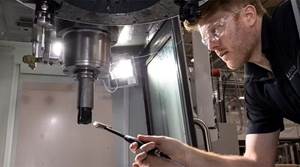

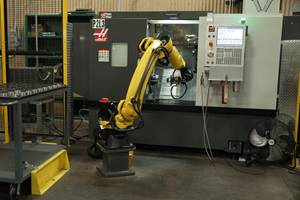
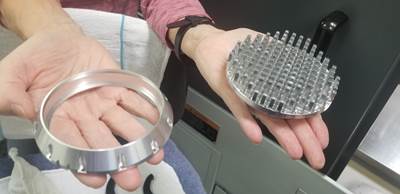


.jpg;maxWidth=970;quality=90)